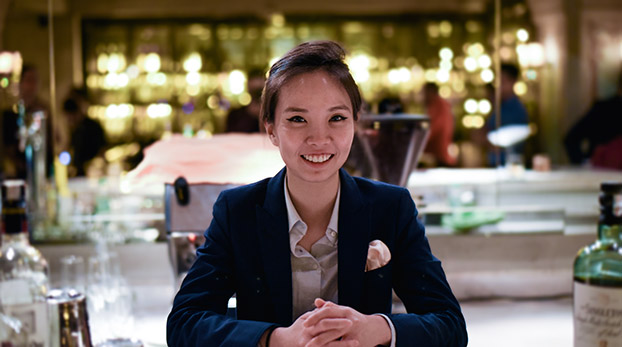Photography: Light Show Photography
What got you started as a bartender?
I started working in the food and beverage industry after I did my A-levels. My best friend at the time was studying at Le Cordon Bleu in Australia, and every time she came back she would work here for experience, so she asked me if I would like to start waitressing at a steakhouse-type restaurant she was working at – that is how I got started behind the bar: cutting garnishes, washing glasses, making a few simple drinks. Three years later (2009) Diageo World Class was in Singapore (back then it wasn’t like the six month-long intensive programme that it is now). When I won, I went to compete in the Global Finals in London and I experienced the local bar scene through a guest shift – and what really inspired me was my guest shift in London at Montgomery Place, a small cocktail bar whose head bartender at the time was Marian Beke (who now heads Night Jar in London), because I saw how people could become career bartenders and it gave me an understanding of what we weren’t so good at in Singapore: providing enjoyable customer experiences, because it’s your job and you enjoy doing it.
How have you seen World Class change from when you first started in 2009?
The programme has evolved from not just a competition, but now to a fraternity who share an understanding of what goes on in this industry. It’s really helped motivate and encourage people, and it’s become deeply rooted in the bartending communities in all the countries we run it.
What do you think of the quality of the bartenders you have seen in Malaysia and Singapore?
There’s a lot more enthusiasm, and one thing that is very heartening to see is that these bartenders are friends and they support each other – this is one of the things we wanted to do, to grow the community. The standard has changed a lot as well; in Malaysia now there are a lot of bars that are in the style of what people love to go to in Europe. One thing I would like to see grow is for bar tending to be seen as a serious career, and for bartenders to be paid good salaries – as one customer I spoke to recently said, “You know the bar scene has evolved when bartenders can afford to drink where they work.”
As a woman, have you noticed any increase in the number of female bartenders over the years?
I think in Southeast Asia there’s still a little bit of a boy’s club in certain establishments – that discourages women from working behind the bar. I think it’s something that will evolve, because I see some bars that are very encouraging of their staff regardless of gender – that needs to become more widespread.
Any final words for the competitors this year?
Think of this as your daily job rather than a competition, which will make all the difference. When they go to the Southeast Asian finals and the Global Final, the plans are for the winner to be representing the Reserve brands at a lot of events, masterclasses in other markets. What they do behind the bar for the competition will become a large part of their life.
